SimsVille Preview
We've got brand new details and shots of SimsVille directly from Maxis.
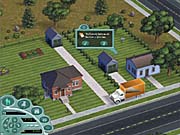
It was only a matter of time before someone came up with the idea of taking the concepts behind Maxis' two most successful franchises--SimCity and The Sims--and mating them to form a city-building game with a personal touch. Unfortunately for developers everywhere, that someone was Maxis. "The idea for SimsVille actually came from fan feedback," explains the game's associate producer, Virginia McArthur. "It essentially answers their wishes to explore, buy, and customize areas beyond the [Sims'] house." SimsVille is basically a grander version of The Sims (or a more personal version of SimCity?) in which you control the lives of an entire town of families--not just a single family as in The Sims, but not quite a faceless metropolis as in SimCity either. Your ultimate goal is to create a prosperous town from scratch. That town's success, however, is directly related to the happiness of its citizens. Likewise, the well-being of the townsfolk is dependent on the welfare of your town. It's a precarious balancing act, to be sure, but it's one that Maxis has found great success with in its SimCity and The Sims series. We were able to take a close look at SimsVille during a recent trip to Maxis' offices, and we walked away with new gameplay details, screenshots, and impressions in tow.
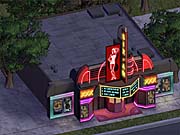
Like the other Sims games, SimsVille is split up into several different modes: live mode, buy mode, and build mode. This latter option is similar to SimCity--you'll start out with a fairly inconspicuous plot of land that you have to mold into a living town. In the build mode, you'll be able to lay down roads and construct shops, houses, and industries to entice Sims into moving into the town you've created. It's this combination of residents and businesses that will keep your town afloat because of the flat tax that they'll pay you. This tax goes into the town coffer, which is where the money used in the build mode comes from. There are a huge number of structures, buildings, and objects that you can select from in the build mode; specifically, there are 80 types of buildings, 15 houses, and five types of roads, and each of these objects affects your populous in a distinct manner, especially when you take into account that SimsVille has day and night cycles. For example, the simple act of placing street lamps on corners will increase visibility in the evening and reduce crime. Building a police station will reduce the crime rate in your town even further. Naturally, crime reduces happiness, which in turn can reduce job efficiency, which can cause businesses to shut down, thus reducing the total tax entering the town coffer. As you can tell, interdependence plays an important role in SimsVille.
To illustrate just how bad a town can get, McArthur showed us a custom town that she calls "Smudgedale," which was lined with liquor stores, businesses with boarded-up windows, and an adult movie theater. While this town was actually purposely created to look slummy, it's a perfect example of what can happen to a typical town if your citizens' needs and happiness aren't addressed. A town like Smudgedale doesn't produce much income tax, and the only way to recover from its downward spiral is to sell off homes and businesses. The downside to doing that, however, is that selling off homes and stores will displace your residents, further reducing your taxable population. And since you won't be able to get nearly as much money for a run-down liquor store as you would from a respectable business, you'll have to sell off your only means of income to rebuild your town. What's worse is that it costs money to sell these properties (bulldozers don't come cheap), so if you're not careful, your perfect town can turn into a disaster from which recovery is an arduous task.
Keeping Up With the Sims
Thankfully, keeping your town's populous happy isn't any more difficult than keeping a typical Sims family satisfied. Each house in the town represents a family, and each family will have a different number of Sims, each of whom has five needs--energy, fun, environment, social, and hunger--and a number of individual interests like extreme sports, nature, science, music, fine arts, gardening, sports, gourmet, and fashion. Each of your families will have a distinct pool of money that's separate from the town coffer, which you can use to purchase different items that will address that family's interests. This is done in the game's buy mode, and anything you buy for a specific family comes out of that family's savings. For instance, a quick way to satisfy an extreme sports interest is to buy an outdoor rock-climbing wall, while holding a fashion shoot is a great way to address someone's fashion interests. Needs, on the other hand, are addressed by building town-specific buildings, like restaurants to satisfy hunger, parks for fun, and so on.
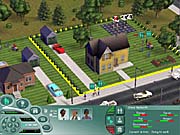
Each family initially starts with the same amount of savings, but their income is dependent on the type of job they find in your town. Every single structure that you construct needs to be staffed with a number of employees, be it an ice cream parlor or a police station, and the inhabitants will eventually gravitate to the jobs that they're qualified for. However, you can forcefully "suggest" to any of your townsfolk to get a certain job by picking them up and placing them in front of a store or business. This suggestion won't always be accepted however, and if that Sim doesn't want the job (or simply doesn't want to work) then he or she will walk away. Needless to say, a retail store will pay much less than a full-time business will. To get your Sims' qualifications up to standards, McArthur suggests building schools in your town: "SimsVille will have regular schools for kids and night school for adults." These schools will give your Sims the skills necessary to obtain some of the game's more lucrative jobs, which include editorial positions at a local fashion magazine, vineyard keepers, farm owners, and even designers at a game development studio. For those who prefer the slower pace of a part-time job, however, you'll be glad to know that SimsVille will let you change the textures on some of the stores to have your name listed instead of a default moniker, like "Al's Grocery Store," for example.
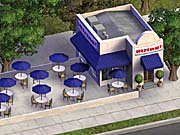
And once your families start making money on their own, you'll be able to purchase a number of items for their homes that'll increase their happiness, just as it does in The Sims. Unlike in The Sims, however, you won't actually be able to decorate the inside of your house, but you'll have a wide set of customization options for the area outside your home all the same. There are more than 100 different objects, including everything from awnings to sports cars. And in a page taken from The Sims: House Party, SimsVille even has a number of party objects like BBQ grills and dance floors that you can buy and install to attract neighbors for a small gathering, which raises the happiness of everyone involved. Interestingly enough, the game's AI has somewhat of a "keeping up with the Joneses" mentality that will cause your neighbors to one up your every move. Buy a new station wagon, and they'll buy a new Porsche.
New Game, New Look
Of course, if your Sims are successful enough, they'll want to move out of their house altogether. Whenever a family starts outgrowing its britches, its housing need will start to rise. By using the game's methods of forceful suggestion, you can place this family in front of a larger house, and if that house suits that family's needs (and if they can afford it), they'll decide to move in.
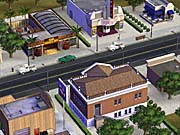
Another interesting aspect of SimsVille is the reward buildings. These are structures that are awarded to you for meeting specific town coffer or town happiness criteria, and they add a distinct facet to your current game. For instance, one of the reward buildings is the town hall, which, incidentally, is the only form of government in SimsVille. The town hall is used as a gathering place for your Sims to voice their collective feedback. Without a town hall, the only way to judge the overall mood of your citizens is by checking them one by one, which can get tedious pretty quickly. With it, however, you'll often find your Sims lined up outside to protest squalid living conditions, or if the town is generally doing well, they'll have a street party right in front of the town hall. Other reward buildings include the stadium, the amphitheater, and the symphony hall. All of these are venues where more than 50 Sims can get together. With these buildings in place, it's very easy to maintain the overall happiness of your townsfolk, since places like a stadium make it possible for people to meet and perpetuate friendships, especially if that place is centrally located. Some of the later rewards will include a farmers' market and a miniature-golf course.
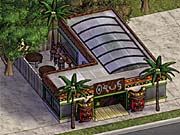
While SimsVille certainly has elements of item collection and urban planning, it doesn't feel like a cut-and-dried amalgamation of SimCity and The Sims. SimsVille looks and plays like a game that was developed to stand on its own two legs, as it were, and while similarities between it and previous games do exist, they're subtle, not overwhelming. The most noticeable distinguishing feature between SimsVille and Maxis' previous games is its 3D engine. All the vehicles, objects, and inhabitants are 3D models that are rendered in real time. SimsVille will let you zoom in and out of any given scene, but it won't let you rotate the camera in real time. The game, like SimCity and The Sims, will let you view your town from four distinct 90-degree angles, but these perspectives will have to be rendered one at a time. This is because the game doesn't draw all the polygons of the world at any given time. In fact, for a typical four-sided house, only two sides are drawn at any given time. The other two sides aren't rendered until you switch to a different perspective, thus saving the processing power needed to draw additional objects onscreen, like more Sims. It was possible for Maxis to make the entire world of SimsVille rendered in real time, but like all of the company's products, this game is also aimed at the mainstream market--a market not typically known for owning high-end PCs. However, the game does employ a "lazy" camera, whose momentum causes it to shift back and forth as you pan it left and right, in an effect that's great at mimicking a full 3D environment.
Like most of Maxis' game, SimsVille will be supported through an official Web site when it launches early next year. Naturally, Maxis expects that a community of SimsVille players will form online, and the company is planning on helping the growth of such a community by adding a number of customization tools to its site. The Sims players won't be left behind when this game releases, either, as your Sims family will automatically default to SimsVille when you install the game. Ultimately, because of its ability to blend the impersonal city-building aspect of SimCity with the micromanagement of The Sims, SimsVille will undoubtedly appeal to fans of all Maxis' games.
Got a news tip or want to contact us directly? Email news@gamespot.com
Join the conversation